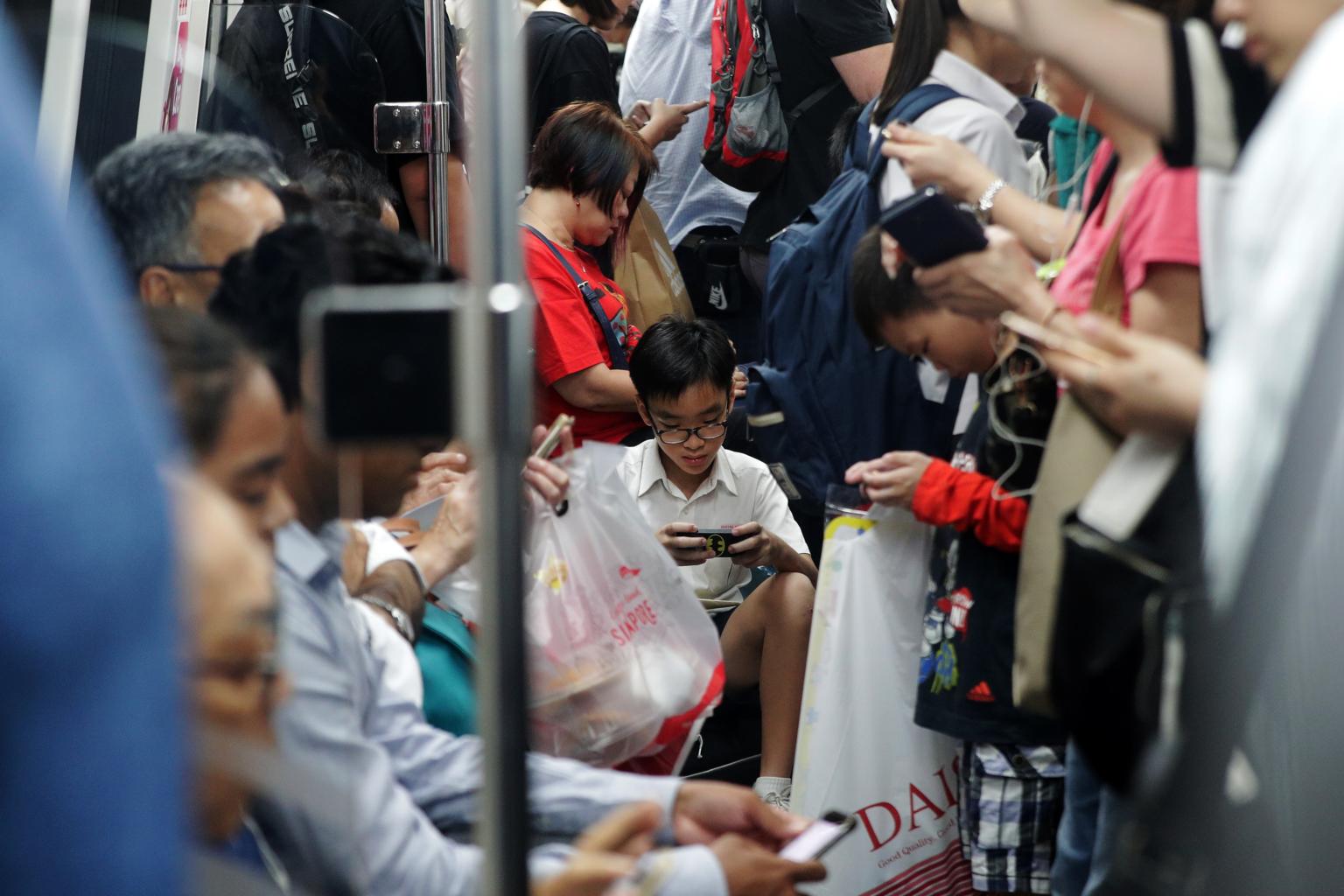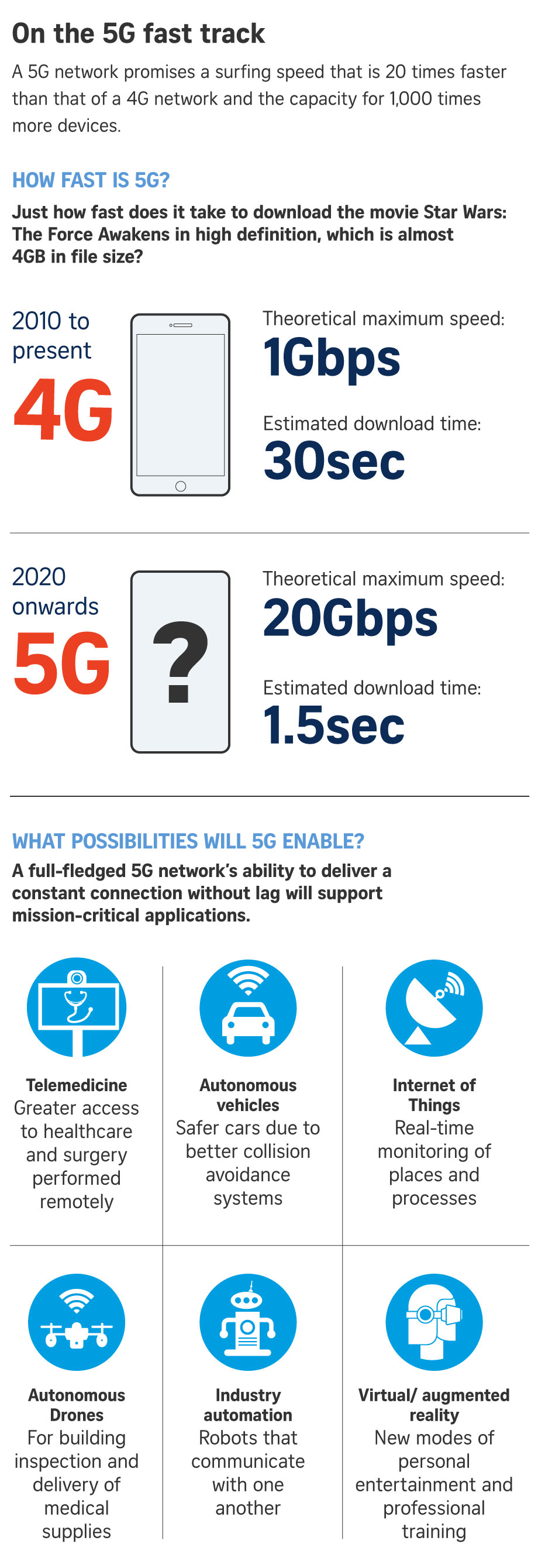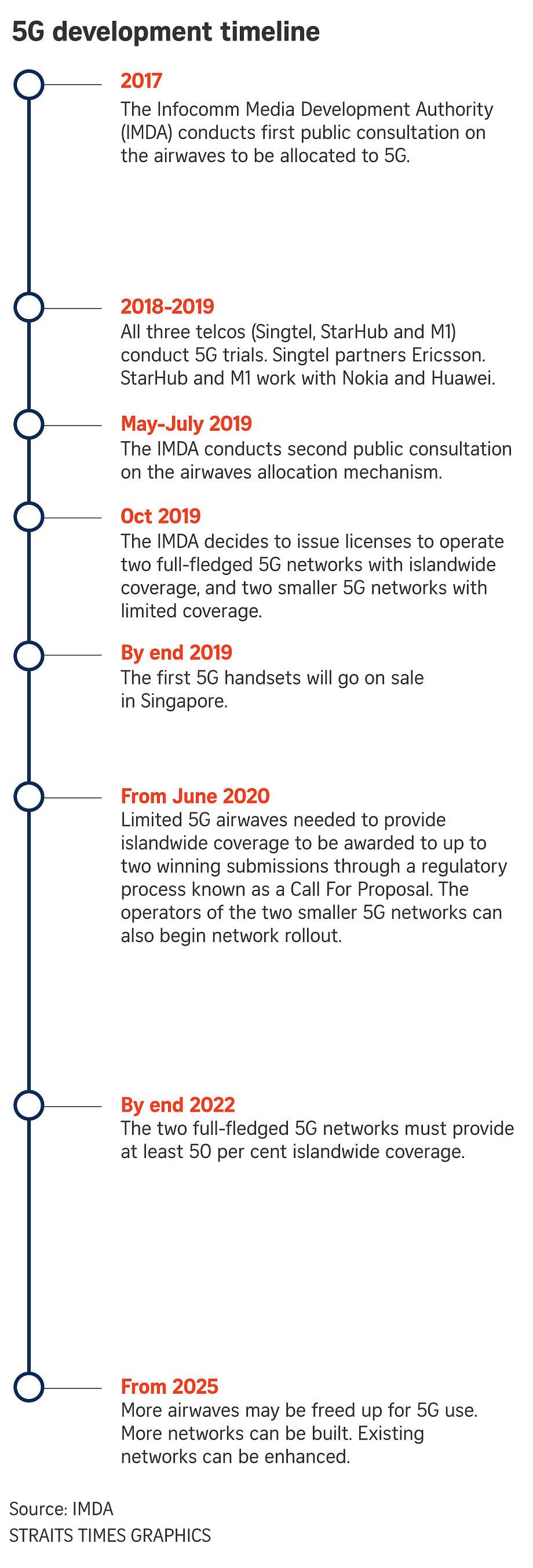Up to four 5G networks being planned to secure Singapore's digital future
Sign up now: Get ST's newsletters delivered to your inbox

A photo taken on Aug 7, 2018, showing train commuters on their phones. 5G promises 20 times faster surfing speeds than what 4G networks offer and the ability to connect 1,000 times more devices.
PHOTO: ST FILE
SINGAPORE - Singapore has set its sights on up to four 5G networks, instead of the two initially planned for, as the authorities take bolder steps to spearhead developments believed to be crucial to the nation's economic growth.
All four networks can be rolled out by next year, although nationwide coverage will take much longer and be limited to only two networks due to the scarcity of 5G airwaves for islandwide reach.
The Infocomm Media Development Authority's (IMDA) more aggressive push to have two extra smaller 5G networks will take into account immediate industrial needs, for example, in smart ports and smart factories to remotely operate cranes or vehicles to move shipping containers or goods round-the-clock.
The IMDA's decision comes after a two-month-long public consultation completed in July this year that heard calls for the involvement of all four telcos here - Singtel, StarHub, M1 and TPG Telecom - to spur innovation.
The authority had originally planned to give out licences to operate only two 5G networks with nationwide coverage built with the most advanced technologies that do not piggyback on existing 4G technologies.
Announcing the decision on Thursday (Oct 17), Minister for Communications and Information S. Iswaran said Singapore can accommodate two more localised 5G networks in addition to two nationwide ones to involve all four telcos here.
"IMDA expects the greater competition to benefit consumers and businesses and bring about greater choice, more competitive prices and service innovation," he said. "Singapore's 5G ecosystem will be the backbone of our digital economy."
He was speaking at the second annual SG: Digital Industry Day held at the Suntec Convention Centre.
The IMDA's current position does not compromise Singapore's original intention to be among the front runners in the roll-out of next-frontier applications, possible only through the roll-out of a full-fledged 5G network.
The technology promises 20 times faster surfing speeds than what 4G networks offer and the ability to connect 1,000 times more devices. A full-fledged 5G network will also be able to support critical applications such as driverless car navigation and remote surgery that requires a constant connection without lag.
The IMDA has called for interested operators to submit detailed proposals on their deployment plans by January next year, with the intention to assign 5G airwaves needed to provide islandwide coverage to up to two winning submissions by June next year.
The selection will be done through a regulatory process known as a Call For Proposal rather than an airwave auction. Proposals will be assessed on telcos' financial capability, as well as network security design and ability to achieve 50 per cent islandwide coverage by end-2022.
Operators of the nationwide 5G network need to each offer at least $55 million for the scarce 3.5GHz band of airwaves to provide nationwide coverage. There is an additional utilisation fee of $154,000 per year over 15 years for this band.
The operators will also be given the millimetre wave (mmWave) spectrum in the 26GHz and 28GHz bands free of any licence fees. But an annual utilisation fee of $1.232 million will apply over 16 years for each operator.
Meanwhile, operators of the two smaller 5G networks will only be given the mmWave spectrum. The same utilisation fees apply over 16 years.
They are allowed to piggyback on existing 4G technologies initially as 5G technologies for mmWave deployments are not yet available.
The race for 5G supremacy is linked to economic progress, and is at the centre of an ongoing trade war between the United States and China.
The US has also been trying to stop its allies from using 5G mobile systems supplied by Huawei for fear that the Chinese government could use its equipment for espionage.
So far, only Australia, Japan, New Zealand and Vietnam have joined the Huawei ban.
Earlier this month, the US said it will evaluate how it will continue to share important information with governments that have 5G networks using equipment and components from "untrusted vendors", referring to Huawei.
Responding to this, Mr Iswaran said: "We share with many other countries the need to ensure that the 5G networks are secure; that's why we made security an important consideration in the call for proposal."
Reiterating that Singapore has not banned any vendors, he added: "We have emphasised the need for resilience and vendor diversity in our systems, and also that the systems meet our security requirements.... to qualify for the call for proposal award."
Projects on next-frontier 5G apps
Several projects have qualified for a grant from a $40 million fund set up by the National Research Foundation and the IMDA in June this year. It is aimed at accelerating the development of next-frontier 5G applications to support Singapore's ambition to lead in the global digital economy. The projects are in the following areas:
1. Smart mobility
Real estate firm CapitaLand, map service provider Navinfo Datatech and telco TPG Telecom will be testing cloud-based driverless car navigation at Science Park 1 and and 2 over a 5G connection.
By shifting the processing of traffic data from an in-vehicle system to the cloud, it is hoped that the cost of autonomous vehicles can be reduced. The firms will also be testing how quickly data can be obtained from numerous data sources such as sensors on road infrastructure and other vehicles for navigation purposes.
2. Cloud gaming
Gaming accessories firm Razer and telco Singtel will be testing how 5G networks should be designed in an urban environment to allow consumers to stream and play games with rich visual details using their mobile phones. The mobile connection must have minimal lag for enjoyable gameplay.
Environmental interference such as how buildings, street furniture, trees and wet weather affect gameplay will also be studied.
3. Smart port
Port operator PSA International has appointed telcos Singtel and M1 to conduct trials in the third quarter of this year to explore the use of driverless vehicles to move shipping containers round the clock.
This will allow PSA to load and unload more containers and turn around ships faster. The telcos will also set up trials for the remote control of port equipment such as cranes.
The trials will pave the way for the building of a state-of-the-art Tuas Port, expected to open from 2021 in stages, to reinforce Singapore's position as a leading port in the region.
4. Smart factory
The Agency for Science, Technology and Research's (A*Star) Advanced Remanufacturing and Technology Centre has signed a memorandum of understanding with Singtel and industrial estate developer JTC Corporation to integrate 5G connectivity solutions into its smart Model Factory in Jurong.
The factory is a test-bed for advanced manufacturing tools, including smart sensors for tracking the location of driverless vehicles on factory floors. The trials will also explore the use of virtual reality teaching tools for training factory operators in, say, equipment maintenance.




